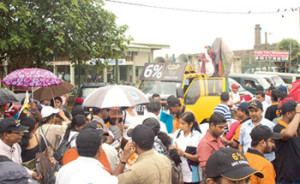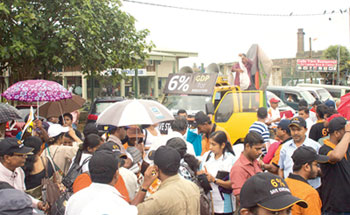
Andi Schubert
The trade union action of the Federation of University Teachers’ Associations (FUTA) is now about to enter its fourth month. Prior to and during the strike a number of debates and discussion have raged between supporters, opponents and observers about the issues raised by FUTA viz. education and the crisis facing the education sector in Sri Lanka. In this short article I hope to examine the nature of the debate so far and hope to broaden it by introducing the dimension of social emancipation. This article is the further development of a point I raised during the “Forum with Eran” program organized by Eran Wickramaratne MP on the 26th of September which brought together Dr. Nirmal Ranjith Dewasiri and Prof. Rajiva Wijesinha MP for a discussion on the education crisis in Sri Lanka.
Current discussions on the FUTA strike
The debate on the FUTA strike has brought to the fore a number of key questions about education, trade unionism, policy development and the future of students in this country. In this section I try to document some of the major debates on these issues as they have appeared in the media since the beginning of the FUTA strike. I must note that the list below is not an exhaustive one but I have tried my best to capture some of the key debates that have taken place so far. In doing this I don’t attempt to take sides but simply hope to document some of the key issues that have been raised in the media.
The discussions on the issue of education include the need for higher allocations for education, the question of whether private expenditure on education should be considered part of the government’s education allocation, the way in which an increased allocation for education should be spent, the financing of higher allocations for education as well as the question of the introduction of the private sector as an education provider (especially at the university level). Another aspect of this debate has been the discussion on the quality of education generally and more specifically on the quality of teaching in the university as well as in schools around the country. Questions have also been raised about the quality of research and knowledge production within academia mainly because of the call by FUTA for better salaries for academics. Most importantly FUTA has succeeded in creating debate as to the purpose of education (specifically tertiary education) in the country and a wide debate has raged on whether the primary aim of education should be for employment or for knowledge or both (and to what degree of each).
In terms of trade unionism the debates in the media have ranged from the legitimacy of FUTA’s trade union action to whether it is within the scope of a trade union action to call for policy change. There have also been a number of articles that either critique or praise the tactics employed by both FUTA and the Government in seeking to resolve the current standoff. Another important aspect of the debate on trade unionism has been the question of voice in a broader social movement for change and questions have been raised about the capacity of FUTA to represent a variety of interest groups as it evolves into a larger social movement calling for serious change in the education sector.
This has also led to serious debates about the process through which policy development takes place in Sri Lanka, and questions have also been raised as to who should be consulted in policy formulation and whether there is a need for wider public consultation in policy development. Furthermore in the light of a number of educational blunders, serious questions have been raised as to who should take responsibility for educational policy though there appears to be very little consensus on this.
Interestingly much of the debate has also focused on the “student” and both FUTA and its detractors have invoked concern about the student in seeking to legitimize a variety of stances. I must note here that “the student” appears to be stuck in a time warp between the present and the future as FUTA’s detractors point to the plight of current students while FUTA has sort to emphasize the need to think about the future student and the capacity of education to support her/his development.
A blind spot in the debate?
Three months into the FUTA strike it would be unlikely that there has been any aspect of the debate on education that has not received much attention. However, there is one significant issue that is yet to receive much attention but which I believe would significantly broaden the terms of the debate on education that has taken place so far.
In an extremely interesting article, a key FUTA member and prominent academic Prof. Jayadeva Uyangoda excellently argues that the introduction of free education provided by the welfare state was widely seen as a stepping stone to social emancipation for a class of people in the country that had been severely marginalized and excluded during colonial times by the elite as well as the British. It was hoped that education would open doors to employment in the public sector that had hitherto been limited to the elite who had the capacity to pay for a private education that in turn secured them employment in lucrative and respectable public sector jobs.
However, the welfare state was unable to cope with the surging demand for public sector employment or provide the necessary infrastructure to ensure that all students across the country received the quality of education that would enable them to secure similar employment prospects in the public sector. As a result Uyangoda argues that the State could only provide partial social emancipation in so much as it provided a new generation of youth with the education but it could not secure complete social emancipation for the vast numbers of rural, lower middle-class young men and women. Or as Uyangoda puts it “the system could not help them beyond purchasing one way tickets to higher education.”*
Social emancipation in an era of patronage politics
I want to build on Prof. Uyangoda’s insights to argue for the need to re-examine the link between education and social emancipation. In a country that has come to rely more and more on patronage politics, the onus is placed on personal relationships to mediate and facilitate personal interests in order to achieve social emancipation. In this context it is hardly surprising that the Government’s intransience seems to suggest that the existing system is adequate to bring about social emancipation.
Amidst the cacophony of the voices that are speaking out on education in Sri Lanka, I believe that at the heart of the issues raised by FUTA and its supporters is the question of the contribution of education to the social emancipation of marginalized youth around the country. What is not articulated however, is the question of as to how increased funding for education will enable this social emancipation.
Therefore, it is necessary to pose a few questions that I believe can broaden the debate on the current education crisis in Sri Lanka. What do marginalized young people expect from education today? What is the link between education in Sri Lanka today and the desire for social emancipation? Does education still only offer partial emancipation? Would the increased allocation of funds for education bring about social emancipation or stymie it by creating expectations that cannot be fulfilled? Is the creation of employable graduates the answer to the demand for social emancipation? This can also broaden the understanding of who is responsible for bringing about social emancipation, and goes beyond the narrow confines of the debate on graduate employability.
By seeking to answer these questions we can broaden the discussion even further into the role that education is expected to play in a developing society. While lauding FUTA for creating and generating debate on the current status of education, I believe it is important that there is also an articulation of the relationship between education and social emancipation. This is because in the final analysis the questions FUTA has so successfully raised are not limited to education alone but impinge on the very meaning of social emancipation and its role in combating oppression.
*I have made a rather clumsy attempt to paraphrase what is a truly insightful and thought provoking article. For the full version of this article see Uyangoda, J. (2003). Social Conflict, Radical Resistance and Projects of State Power in Southern Sri Lanka: The Case of the JVP. In M. Mayer, D. Rajasingham-Senanayake, & Y. Thangarajah (Eds.), Building Local Capacities for Peace: Rethinking Conflict and Development in Sri Lanka (pp. 37-64). New Delhi: Macmillan India.
